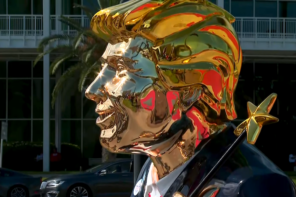Republicans of all kinds—religious and political leaders alike—are faced with a difficult choice these days: they can either capitulate to Trump, do a delicate two-step trying to differentiate themselves from him, or reject him outright. Many elected officials are taking door number one. Paul Ryan, among others, is taking door two.
That might explain some of his recent rhetoric on poverty: it could be that he’s staking out a position as a kinder, gentler Republican than that nasty blowhard from Manhattan. That certainly would give vulnerable Republican candidates cover to differentiate themselves from Trump. Maybe that way they can survive the wrath that is to come in November. We’ll see.
Ted Cruz opened door number three on Tuesday:
“This man is a pathological liar,” Mr. Cruz said, ticking off Mr. Trump’s distortions, his infidelities, his penchant for conspiracy theories. “The man is utterly amoral.”
As I mentioned the other day, the rejectionist route seems to be the one Baptist leaders are taking as well.
Any of these options involves some risk, but door number three is a particularly dicey maneuver. It’s basically telling Trump and his supporters to kiss off. Since those supporters make up a fair portion of the conservative movement, anybody hoping to lead it in the future has to hope they will have enough of their own people remaining to do so. That’s the gamble Ryan and Cruz are making—Ryan just can’t afford to be as explicit about it as Cruz has been.
Russell Moore, Al Mohler, et. al., seem to be making a similar wager, and one that’s actually more interesting, if you’re paying attention.
On a video posted by The Gospel Coalition, Moore disavowed the idea of America as a “Christian Nation”:
“If what you mean by that is a nation in which most of the people profess to be Christians, then certainly the United States of America was and is a Christian nation,” said Moore.
“The idea that God was in covenant with the United States of America in order to bless the United States as a special people, as a New Israel, as a group of people covenanted under Christianity — the answer to that is clearly no.”
This no doubt raised some eyebrows. The Christian Post carefully noted its resemblance to the position of Americans United for Separation of Church and State, often an evangelical bête noire.
So what gives? Well, this is part of a larger effort by Moore and other Southern Baptist leaders to disentangle the denomination from ideological evangelicalism—the idea that being an evangelical is primarily a matter of a conservative social identity. (Yes, the SBC was heavily involved in building ideological evangelicalism in the first place. They’ve had second thoughts, apparently.)
Moore’s no idiot. He no doubt has demographic data in front of him that shows the SBC is going to be in real trouble if it doesn’t differentiate itself from the GOP… like, yesterday. So he’s making a tactical move by stipulating the point that America’s not a Christian nation in the way most people understand that phrase. That gives Baptists the room to disavow the fire and wrath they see coming in November. It won’t change a thing about their social positions, but that’s exactly the point. Cleanly separating their positions from electoral politics makes it easier to hold onto them, since they won’t be associated with an odious, doomed candidate.
But before you get too exercised by Southern Baptists holding onto anti-gay beliefs for as long as they can, realize this: Moore’s tack also lets them hang onto the work they’re doing in racial reconciliation.* It also allows them to position themselves away from dead-enders like Kim Davis. Moore wants to project an image of the SBC as conservative, yes, but living in the same world as everybody else.
I’m not sure it’s fair to say that this is Moore playing politics, exactly. As I say, his comments are part of a larger effort to steer the SBC away from evangelicalism as a social identity towards a more religious identity. Given the long-term trend in American religious affiliation, it’s the right move. Any church that can’t differentiate itself from secular society is going to be in trouble, whether liberal or conservative. It just so happens that announcing it now also helps distance them from Trump, for which Moore is surely grateful.
But to my mind, the most political part of the story is right here:
Moore’s comments were uploaded by The Gospel Coalition, a theologically conservative group largely comprised of pastors in the Reformed tradition.
There’s been a long-running debate in the SBC between traditional, pietist Baptists and neo-Calvinist elements, like The Gospel Coalition. The former sometimes even shade away into Anabaptist positions, such as focusing on social service ministries and pacifism. They are also decidedly less political than other parts of the Baptist world.
The latter—more or less headquartered in Albert Mohler’s Southern Baptist Theological Seminary—are typically political hyper-conservatives and theological hard-asses. That’s the group Moore’s throwing in with, and implying that if Baptists don’t do the same, they’re falling prey to “theological liberalism.”
In other words, Moore’s positioning himself against opponents in both the church and secular world by embracing a traditionally liberal idea while decrying theological liberalism. Nixon couldn’t have done it better. This guy’s got a future in politics.
*Moore makes this very point in an op-ed in this morning’s New York Times: A White Church No More. Christena Cleveland, among others, argues forcefully that racial reconciliation as practiced by the SBC is not the same thing at all as racial justice. That’s true, I think, but the point for this discussion is that Moore can’t engage that work even imperfectly if he’s tied to white supremacists’ favored presidential candidate





